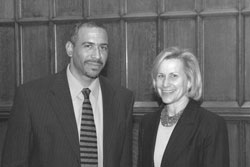Keeping the American Dream Alive in Urban Public Schools
The promise of the American Dream for many children lies with the public schools, says Pedro A. Noguera, Sussman Visiting Professor of Education. Public schools are the last safety net for children in need of adult supervision, access to a nurse, food, shelter and heat-even if they may not get those things at home. Because of this, public schools are vital to the health and welfare of all our nation's children.
During the annual Sussman Lecture, "City Schools and the American Dream: Reclaiming the Promise of Public Education," Noguera said that the United States has not effectively demonstrated it has the will to provide all children with the education they need to succeed. The search for a better education has disintegrated into blaming students, teachers, schools and parents. "This blame game doesn't get us very far, but it does contribute to the paralysis that says we can't do something about it," said Noguera, a professor at the Steinhardt School of Education at New York University. The Sussman Lecture and Professorship is made possible by the generosity of Teachers College Trustee Laurie Tisch.
For children in poverty to succeed, they need more than just a good curriculum and teachers-they require access to dental work and removal of lead paint from their homes, he says. Health care is just one of the many problems that poverty-stricken children face. Concentrated poverty affects learning, school function and expectations that teachers have of students, and pervades the entire educational process, he stated. All of these factors are too much for teachers and schools to handle. They need help and support to succeed in this environment; the children also need social workers and counselors. "We need to design schools where the way kids and parents are served matters, or there won't be incentive for large-scale change," Noguera said.
Rather than pushing testing, public schools should create an environment that works on the whole palette of student needs, within schools free from violence. This approach will build relationships between students, teachers and parents that will encourage them to achieve academically and feel safe doing it. "Good education," he says, "will come from our ability as a nation to create the will and commitment to generate the schools we need."
Published Saturday, Apr. 2, 2005
